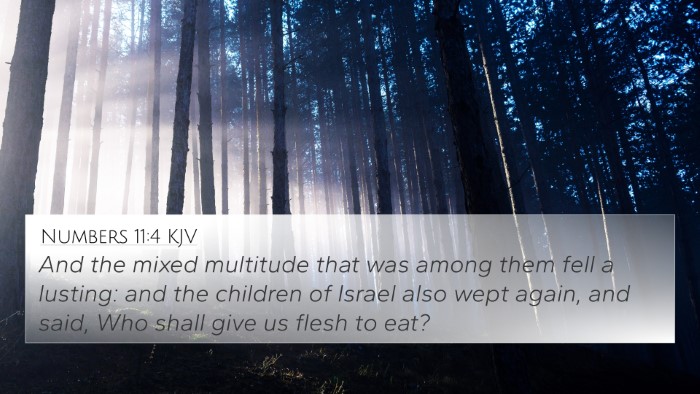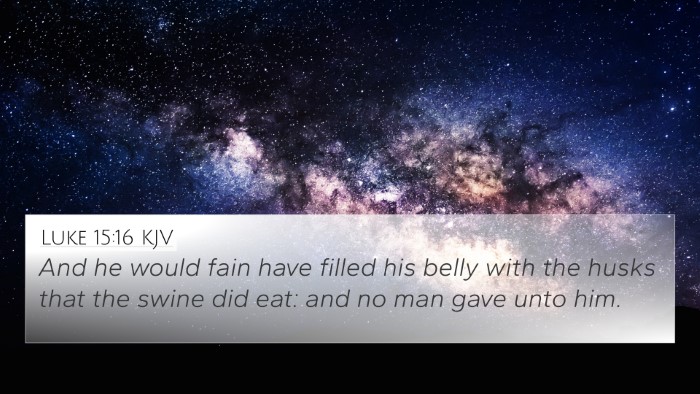Understanding Proverbs 27:7
Proverbs 27:7 states, "The full soul loatheth an honeycomb; but to the hungry soul every bitter thing is sweet." This verse provides profound insights into human nature and our relationship with contentment and desire.
Verse Meaning Summary
The overarching theme of this verse suggests that those who are full and satisfied may take for granted the sweetness of the best things in life, while those who are hungry find delight even in the most bitter experiences. This metaphor extends to spiritual and emotional fulfillment, reminding us that true satisfaction often comes from recognizing the value in what we have.
Commentary Insights
-
Matthew Henry:
Henry emphasizes that a person's state of mind greatly influences their perception of life. A full soul may despise the sweetness around it, illustrating how abundance can lead to apathy. In contrast, the hungry soul appreciates every morsel, interpreting it as a gift. This commentary reflects on the necessity of humility and recognizing our true needs.
-
Albert Barnes:
Barnes notes that this verse illustrates the disparity in human experiences. He points out that unfulfilled desire offers a unique sweetness to otherwise bitter experiences, indicating that contentment is subjective. The hungry appreciate life's offerings more deeply, a profound truth relevant to both physical and spiritual hunger.
-
Adam Clarke:
Clarke discusses the human tendency to overlook blessings when they are frequent. He interprets the honeycomb as a representation of blessings and abundance. The main idea is that our appetites and cravings shape our responses to life's circumstances. When one is full, they may fail to see the value in life's sweetness, while the hungry cherish everything.
Cross-References
Proverbs 27:7 connects with several Bible verses, enriching its meaning through thematic parallels:
- Psalm 34:8: "O taste and see that the Lord is good: blessed is the man that trusteth in him." - This reflects the sweetness experienced in faith amidst hunger.
- James 4:10: "Humble yourselves in the sight of the Lord, and he shall lift you up." - Illustrates the need for humility to appreciate life's blessings.
- Matthew 5:6: "Blessed are they which do hunger and thirst after righteousness: for they shall be filled." - Similarity in the theme of spiritual longing and fulfillment.
- Revelation 3:17: "Because thou sayest, I am rich, and increased with goods, and have need of nothing; and knowest not that thou art wretched, and miserable, and poor, and blind, and naked." - Emphasizes the danger of spiritual complacency.
- Ecclesiastes 6:7: "All the labor of man is for his mouth, and yet the appetite is not filled." - A reminder that physical fullness does not equate to true satisfaction.
- Proverbs 13:25: "The righteous eateth to the satisfying of his soul: but the belly of the wicked shall want." - A contrast between contentment and emptiness.
- Philippians 4:11-12: "Not that I speak in respect of want: for I have learned, in whatsoever state I am, therewith to be content." - Illustrates the virtue of contentment in every circumstance.
Thematic Connections
The themes woven into Proverbs 27:7 encourage readers to explore various aspects of spiritual and emotional hunger, emphasizing the importance of humility and appreciation for God's provisions. These connections provide a basis for a deeper understanding of contentment and fulfillment within the biblical context.
Tools for Bible Cross-Referencing
To enhance your study and understanding of Proverbs 27:7, consider utilizing the following tools for effective Bible cross-referencing:
- Bible Concordance: A reference tool that helps locate verses in the Bible corresponding to specific keywords.
- Bible Cross-Reference Guide: Guides that outline related verses, facilitating the exploration of thematic connections.
- Cross-Reference Bible Study: A method of comparing scripture to analyze similar ideas across different texts.
- Bible Chain References: Systems that label passages that relate to specific themes or verses in a chain format for ease of study.
Conclusion
Proverbs 27:7 serves as a powerful reminder of the human experience with contentment and appreciation. By recognizing the connections between this and other verses, we can glean valuable insights that enrich our lives and deepen our understanding of Scripture. The practice of cross-referencing not only aids in personal study but also fosters a comprehensive grasp of the Bible’s teachings as they relate to each other.








